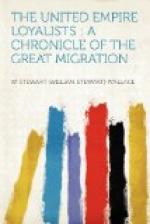I saw [he says] all those Provincial Regiments, which we have so frequently mustered, landing in this inhospitable climate, in the month of October, without shelter, and without knowing where to find a place to reside. The chagrin of the officers was not to me so truly affecting as the poignant distress of the men. Those respectable sergeants of Robinson’s, Ludlow’s, Cruger’s, Fanning’s, etc.—once hospitable yeomen of the country—were addressing me in language which almost murdered me as I heard it. ’Sir, we have served all the war, your honour is witness how faithfully. We were promised land; we expected you had obtained it for us. We like the country—only let us have a spot of our own, and give us such kind of regulations as will hinder bad men from injuring us.’
Many of these men had ultimately to go up the river more than fifty miles past what is now Fredericton.
A second difficulty was that food and building materials supplied by government proved inadequate. At first the settlers were given lumber and bricks and tools to build their houses, but the later arrivals, who had as a rule to go farthest up the river, were compelled to find their building materials in the forest. Even the King’s American Dragoons, evicted from their lands on the harbour of St John, were ordered to build their huts ’without any public expence.’ Many were compelled to spend the winter in tents banked up with snow; others sheltered themselves in huts of bark. The privations and sufferings which many of the refugees suffered were piteous. Some, especially among the women and children, died from cold and exposure and insufficient food. In the third place there was great inequality in the area of the lands allotted. When the first refugees arrived, it was not expected that so many more would follow; and consequently the earlier grants were much larger in size than the later. In Parrtown a town lot at length shrank in size to one-sixteenth of what it had originally been. There was doubtless also some favouritism and respect of persons in the granting of lands. At any rate the inequality of the grants caused a great many grievances among a certain class of refugees. Chief Justice Finucane of Nova Scotia was sent by Governor Parr to attempt to smooth matters out; but his conduct seemed to accentuate the ill-feeling and alienate from the Nova Scotia authorities the good-will of some of the better class of Loyalists.




